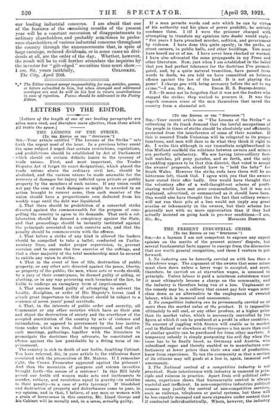LETTERS TO THE EDITOR.
[Letters of the length of one of our leading paragraphs are often more read, and therefore more effective, than those which /ill treble the space.] THE LESSONS OF THE STRIKE.
[To THE EDITOR or THE " SPECTATOR."] SIR, —Your article entitled " The Lessons of the Strike " sets forth the urgent need of the hour. In a previous letter anent the same subject I urged that certain restrictions, regulations, and prohibitions should be established by Act of Parliament
• which should set certain definite limits to the tyranny of trade unions. First, and most important, the Trades Disputes Act (I forget its exact designation), which placed the trade unions above the ordinary civil law, should be abolished, and the various unions be made amenable for the recovery of damages for injury inflicted upon private or public property by the members of such unions. If any union could not pay the sum of such damages as might be awarded in an action brought to recover same, then each member of the union should have a proportionate sum deducted from his weekly wage until the debt was liquidated.
2. That there should be prohibition of a concerted strike directed against the commonwealth for the purpose of com- pelling the country to agree to its demands. That such a col- laboration should be deemed a conspiracy against the State, and that proceedings should be instantly instituted against the principals associated in such coercive acts, and that the penalty should be commensurate with the offence.
3. That before a strike of any kind is allowed the leaders should be compelled to take a ballot, conducted on Parlia- mentary lines, and under proper supervision, to prevent coercion and to ensure the free exercise of the suffrage, and that a clear majority of the total membership must be secured to entitle any union to strike.
4. That in the event of loss of life, destruction of public property, or any other acts directed against the peace, liberty, or property of the public, the men, whose acts or words should, by a jury of their countrymen, be deemed guilty of aiding, or abetting, or in any way procuring such breaches of the law, be liable to undergo an exemplary term of imprisonment.
5. That anyone found guilty of attempting to subvert the loyalty, discipline, or order of His Majesty's forces (and I attach great importance to this clause) should be subject to a sentence of seven years' penal servitude.
6. That, in the interests of public order and security, all Communist or any other societies which have as their aim and object the destruction of society and the overthrow of the accepted constitution of the country by acts of violence and intimidation, as opposed to government by the free institu- tions under which we live, shall be suppressed, and that all such meetings, gatherings, together with the literature to promulgate the doctrines they advocate, be constituted an offence against the law punishable by a fitting term of im- prisonment.
The country is sick to death of our feeble, fumbling Cabinet. You have referred, Sir, in your article to the ridiculous fiasco associated with the prosecution of Mr. Malone. If I remember right, the Crown' Prosecutor appeared against the prisoner ! And then the mountain of pompous and solemn invective brought forth—the mouse of a sentence! In this Bill lately passed our feeble old women make acts and incitements to niurder, robbery, and revolution equal in gravity—in relation to their penalty—to 'a case of petty larcency! If bloodshed and destruction of property and disturbances come to pass, in my opinion, and in that, I believe, of any man or woman with a grain of horse-sense in this country, Mr. Lloyd George and lie Cabinet will be morally and, in a sense, actually guilty. If a man permits words and acts which lie can by virtue of his authority and his place of power prohibit, he actively condones them. I (if I were the prisoner charged with attempting to translate my' opinions into deeds) would reply : " For years I have preached murder, sedition, and government by violence. I have done this quite openly; in the parks, at street corners, in public halls, and other buildings. You must have heard me or of me. I have never been checked or warned.
I have also advocated the same propaganda in my Press and other literature. Now, just when I am established in the belief that-you had perfect tolerance for the doctrines I've promul- gated, and, by a quite natural transition, have passed from words to deeds, we are told we have committed an heinous offence against the law of the land. It is not playing the game! I charge you with being accessory before the act to my P.S.—It must not be forgotten that it was not the leaders who stopped the strike; they worked to procure it. It was the superb common sense of the men themselves that saved the country from a shameful act.


































 Previous page
Previous page